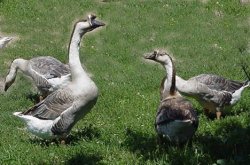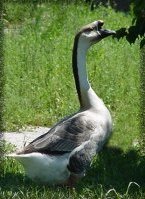 Quaker Farm Home
Quaker Farm Home
|
Quaker Farm
Information About Brown Chinese Geese

Brown Chinese Geese - The Homestead Friend

Prices
Goose Eggs: $2.50 each
Goslings: $10.00 and up - depending on age
Adults: $25.00 and up - depending on age
Chinese geese are considered by many to be the most graceful and beautiful member of the goose family.
They are elegant and dignified on both land and water. Sometimes referred to as "Swan Geese" because of their
long and graceful necks, they, in fact, descend from the wild swan goose native to Asia (Holderread, 1986).
Chinese geese are exceptionally practical. Of all breeds, they are the best layers, most active
foragers, produce the least greasy meat, and, except for Pilgrims, are the easiest to sex at maturity
(Holderread, 1981). With good management, the average Chinese goose produces nearly twice as many goslings as other
geese, laying 40 - 100 white eggs annually. Because they are alert and vocal, they will raise the alarm if a
threat is perceived (Holderread, 1986). Geese eat many grasses and herbaceous plants. If properly managed they
can be employed as "weeders." "Chinese geese are by far the most popular breed for weeding chores due to their
active foraging habits, moderate size, unmatched agility, good availability and reasonable prices."
(Holderread, 1986). Poultry catalogs will commonly refer to this breed as "Weeder Geese."
The Chinese goose is refined and curvaceous. Its bill is relatively long and slender, with a large, rounded,
erect knob that attaches to its forehead. The Chinese holds its head high. Its head flows seamlessly into a long,
slim, well-arched neck which meets the body at about a 45 degree angle. Its body is short, compact,
has a prominent and well-rounded chest, smooth breast and no keel. Its abdomen is moderately full but has no
fatty lobes, except during the laying season when the female may develop a single lobe. The tail should be held
high, which is worth noting as this is a good indication of vitality in ganders. A Chinese goose is often heavier
than it appears, as its feathers are closely fitted. Mature ganders average 12 pounds, mature geese average
10 pounds (Holderread, 1981).
When selecting breeding stock, "pick birds with compact bodies, prominent chests and keelless breasts, wings
that fold in front of an erect tail, slender and symmetrically arched necks and large, rounded knobs that rise
well above the crown of the head. A spry, upright carriage, is important in Chinese since it is a sign of good
health and vigor. Avoid breeding from specimens with drooping shoulders, roach backs, deformed necks and long
bodies." (Holderread, 1981). A ratio of four to six geese per gander, rather than allowing a one to one pairing,
reduces competition in the flock (Holderread, 1981). The Chinese is a hardy breed, however their knobs which will freeze
when temperatures fall below 20Ì to 25Ì F (-5Ì C). It is important to provide the flock some protection during freezing
weather (Holderread, 1986).
There are two color varieties of Chinese geese, brown and white. The original variety is a rich brown and fawn,
accented by a dark, russet-brown neck stripe. In mature birds, the glossy black bill and knob are separated from
the main head plumage by a narrow band of creamy-white feathers. The shanks and feet are brownish orange or dark
orange and the eyes brown. The white variety has blue eyes, pure white plumage, and bright orange feet, knobs and
bills. While goslings of white European breeds are mainly gray with yellow trim, the down of day-old White Chinese
is a bright canary yellow (Holderread, 1981). Both varieties were admitted to the American Poultry Association's
Standard of Perfection in 1874 (Malone, et. al., 1998).
Chinese geese are a most economical breed. Stock are generally the less expensive than other breeds. Their smaller
size coupled with their active foraging ability means they do not require as much food as other breeds. For those
looking for "watchdogs" Chinese are an excellent choice for the home flock (Holderread, 1986).
"The Lord bless thee and keep thee...."
- Numbers 6:24

|